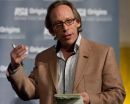(Press-News.org) CHICAGO – From warp drives to hyperspace, science fiction has continuously borrowed from, and sometimes anticipated, the state of the art in scientific progress. This has resulted in the perception that science and science fiction have a causal relationship, one finding direction from and fulfilling the science fantasy laid out before it.
But that is rarely the case, according to Lawrence Krauss, a Foundation professor in the School of Space and Earth Exploration and the Department of Physics at Arizona State University. No doubt, science fiction has taken inspiration from the cutting edge science of its day. And, as Stephen Hawking reaffirmed in the preface of Krauss's bestselling book, the Physics of Star Trek, science fiction helps inspire our imaginations. But Krauss believes science fiction is not a match for reality.
"Truth is stranger than fiction," Krauss said at the 2014 annual meeting of the American Association for the Advancement of Science in Chicago.
"The imagination of nature far exceeds the human imagination, which is why we constantly need to probe the universe via experimentation to make progress," he said. "In fact, I tend to think that what makes science fiction most interesting is what they missed, not what they got right."
Krauss, a renowned theoretical physicist and science popularizer, was giving his talk, "Physics of the future," on Feb. 14 at AAAS as part of a session titled "Where's my flying car? Science, science fiction and a changing vision of the future."
As examples, Krauss mentioned the World-Wide-Web, developed at the CERN scientific laboratory and which governs the world in ways that were not anticipated. He also described "The World Set Free," often quoted as a prophetic book by H.G. Wells, which was published in 1914 and anticipated the development of atomic weapons that could be used in war. It even coined the term "atomic bombs" decades before they became a harsh reality in the modern world and perhaps influencing some of the scientists who went on to create these weapons.
"Nevertheless not only did Wells' continually burning atomic weapons bear no resemblance to the engines of destruction in the real world," Krauss emphasized, "he thought it would unite the world into one society whereas we are painfully aware that it hasn't changed human thinking, except to divide the world into nuclear haves and have-nots."
"Nevertheless it is instructive, and fun, to compare the 'science' of science fiction with that of the real world," said Krauss, who also is the director of the Origins Project at ASU. "Rather than dwelling on things that don't work, it is fun to explore closely related things in the real world that might work."
Krauss discussed a variety of classical science fiction standbys – space exploration, faster than light travel, time travel and teleportation. It seems almost tragic that science fiction is full of space travelers, freely and technologically effortlessly fulfilling their manifest destiny in space while we remain stuck on Earth. But the reality of the situation, according to Krauss, is that space travel costs a lot of money and energy, is a very risky endeavor and humans, as "hundred-pound bags of water," are not built for space.
On a more positive vein, Krauss described how exotica live warp drive and time travel are not ruled out by known laws of nature, though from a practical perspective even if possible in principle they are likely to be impossible in practice. While it is not likely that humans will be "beamed" from one place to another, quantum teleportation might revolutionize computing in ways that science fiction has just begun to come to grips with, said Krauss, who has authored more than 300 scientific publications and nine books, including the international bestseller The Physics of Star Trek, a tour of the Star Trek universe and our universe, and Beyond Star Trek, which addressed recent exciting discoveries in physics and astronomy and takes a look at how the laws of physics relate to notions from popular culture.
Krauss concluded that predicting the future of science if fraught with problems.
"The best part of physics of the future is that we have no idea what the exciting discoveries of the future will be," he said. "If I knew what the next big thing would be, I would be working on it now!"
INFORMATION:
Source:
Lawrence Krauss, (480) 965-6378
Media contact:
Skip Derra, (480) 965-4823; skip.derra@asu.edu
Is truth stranger than fiction? Yes, especially for science fiction
2014-02-15
ELSE PRESS RELEASES FROM THIS DATE:
Citizenship education goes digital
2014-02-15
WACO, Texas (Feb. 14, 2014) --Can playing online video games help students learn civics education? According to Baylor University researchers, the answer is yes.
Brooke Blevins, Ph.D., assistant professor of curriculum and instruction and Karon LeCompte, Ph.D., assistant professor of curriculum and instruction in Baylor's School of Education studied the effectiveness of iCivics, a free online website founded by retired Supreme Court Justice Sandra Day O'Connor that teaches civics concepts using 19 educational games.
The study, published in The Journal of Social Studies ...
Scripps researchers recommend mobile compression device to prevent DVT after joint surgery
2014-02-15
LA JOLLA, Calif. – Research from The Shiley Center for Orthopaedic Research and Education at Scripps Clinic could change how patients are treated to prevent blood clots after joint replacement surgery. A study published as the lead article in the current issue of the Journal of Bone and Joint Surgery determined that after lower extremity joint replacement surgery a mobile compression device was just as effective as blood thinners in preventing deep vein thrombosis (DVT), but without negative side effects including bleeding complications.
The multicenter study, led by ...
Clinical trial success influenced by biomarker- and receptor-targeted therapies in NSCLC
2014-02-15
DENVER – Over the past decade, a great clinical focus has been directed at developing new and innovative therapies for advanced non-small cell lung cancer (NSCLC). An analysis of clinical trials evaluating these therapies demonstrates that the cumulative success rate for new agents for advanced NSCLC is lower than the industry-estimated rate. However, biomarker- and receptor-targeted therapies were found to substantially increase clinical trial success.
The analysis was designed to evaluate the risk of clinical trial failure in advanced (stage IIIb-IV) NSCLC drug development ...
High frequency of EGFR mutations found in Asian population
2014-02-15
DENVER – Adenocarcinoma histology, female sex, never-smoking status, and Asian ethnicity have been considered the most important factors associated with EGFR mutations in non-small cell lung cancer and response to EGFR inhibitors. A recent study has found that, within the Asian population, the frequency of EGFR mutations associated with other demographic and clinical characteristics is higher than previously reported, even in patients with a history of smoking, suggesting that mutation testing should be done on a broader basis among Asian patients with advanced adenocarcinoma ...
MLB largely responsible for players' steroid abuse, UTA researcher says
2014-02-15
The widespread use of illegal steroids among Major League Baseball players has been fueled by an "economy of bodily management," the free agent market and exploding television revenues, a UT Arlington assistant professor argues in a newly published research paper.
Sarah Rose, a labor and disability historian, says by attacking individual ballplayers' morality, commentators have obscured the more salient issue.
"Baseball is representative of the fact that Americans increasingly live in an age of biotechnology in which bodily modification for profit has become the norm ...
Child obesity: Cues and don'ts
2014-02-15
Among the multiple factors that can cause obesity is an abnormal neurocognitive or behavioral response to food cues. The brain becomes wired to seek – and expect – greater rewards from food, which leads to unhealthful overeating.
Attention modification programs, which train a person to ignore or disregard specific, problematic cues or triggers, have been used effectively to treat cases of anxiety and substance abuse. In a novel study published this week in the journal Appetite, Kerri Boutelle, PhD, professor of pediatrics and psychiatry at the University of California, ...
Scientists discover the mechanism of heart failure in fish exposed to oil spills
2014-02-14
Think of an oil spill, and images of fouled beaches and oil-soaked seabirds come to mind. But there are less visible effects as well. For instance, even low levels of oil pollution can damage the developing hearts of fish embryos and larvae, reducing the likelihood that those fish will survive. Scientists have known of this effect for some time, but the underlying mechanism has remained elusive.
Recently, researchers from NOAA Fisheries partnered with a team from Stanford University to discover how oil-derived chemicals disrupt the normal functioning of the heart muscle ...
Screening wastewater biosolids for environmental contaminants
2014-02-14
DURHAM, N.C. -- Every year waste treatment facilities in the United States process more than eight million tons of semi-solid sewage called biosolids -- about half of which is recycled into fertilizer and spread on crop land.
The practice helps solve storage issues and produces revenue to support the treatment plants, but what else is being spread in that sludge?
As industry invents new materials and chemicals for modern products, many find their way to our skin and bloodstream and, subsequently, into our sinks and toilet bowls. More than 500 different organic chemicals ...
Researchers find brain's 'sweet spot' for love in neurological patient
2014-02-14
A region deep inside the brain controls how quickly people make decisions about love, according to new research at the University of Chicago.
The finding, made in an examination of a 48-year-old man who suffered a stroke, provides the first causal clinical evidence that an area of the brain called the anterior insula "plays an instrumental role in love," said UChicago neuroscientist Stephanie Cacioppo, lead author of the study.
In an earlier paper that analyzed research on the topic, Cacioppo and colleagues defined love as "an intentional state for intense [and long-term] ...
Hot issues in climate change research to be debated at AAAS Annual Meeting
2014-02-14
CHICAGO—The "big issues" in climate change science have shifted over the past 4 to 6 years, with several difficult problems resolved while new research challenges rose to the fore. Scientists who are leading advisors on climate change to federal and international policymakers will examine the state-of-the-science in "Research Challenges in Climate Change: What's New and Where are We Going?" on Feb. 14 at the American Association for the Advancement of Science (AAAS) Annual Meeting in Chicago.
"The session will be very forward looking. What we would like to do better ...





